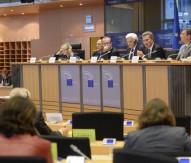
Better, faster treatment for children with cancer
The EU-funded European Network of Cancer Research in Children and Adolescents (ENCCA) project is working to create sustainable collaboration among those working in paediatric oncology in Europe. Researchers are improving collaboration among cancer specialists working with children, bringing together doctors, nurses, patient and parent organisations, drug manufacturers and legislators to get better treatment more quickly to children and young people suffering from the disease.
Cancer affects around one in 500 people in Europe during childhood and adolescence, and remains the leading cause of death from disease beyond infancy. Cancer researchers have made great strides in treating the disease – but more can be done to help those affected.
One way is by bringing together researchers across Europe to share knowledge and best practices instead of duplicating efforts by individual research teams. The expected results include better access to existing biological samples and other resources, support for survivors of childhood cancer, more efficient rules for EU clinical trials, and ultimately better treatments for children with cancer.
ENCCA has already succeeded in developing a broad network of paediatric oncologists and research centres that interact on a regular basis with ethical and legal experts. The network is composed of 34 partners spanning 11 European countries and includes 27 eminent paediatric oncology institutions. ENCCA partners are now actively collaborating with several other EU and non-EU projects and organisations, in order to co-ordinate efforts towards the improvement of paediatric cancer research and cure.
ENCCA project co-ordinator Ruth Ladenstein, of the Children’s Cancer Research Institute in Vienna, said: “Each year 35,000 new cases of cancer in young people are registered in Europe. Thanks to the new treatments developed through national and international clinical trials in Europe the survival rate has improved in recent decades, now up to between 81% and 87%.”




